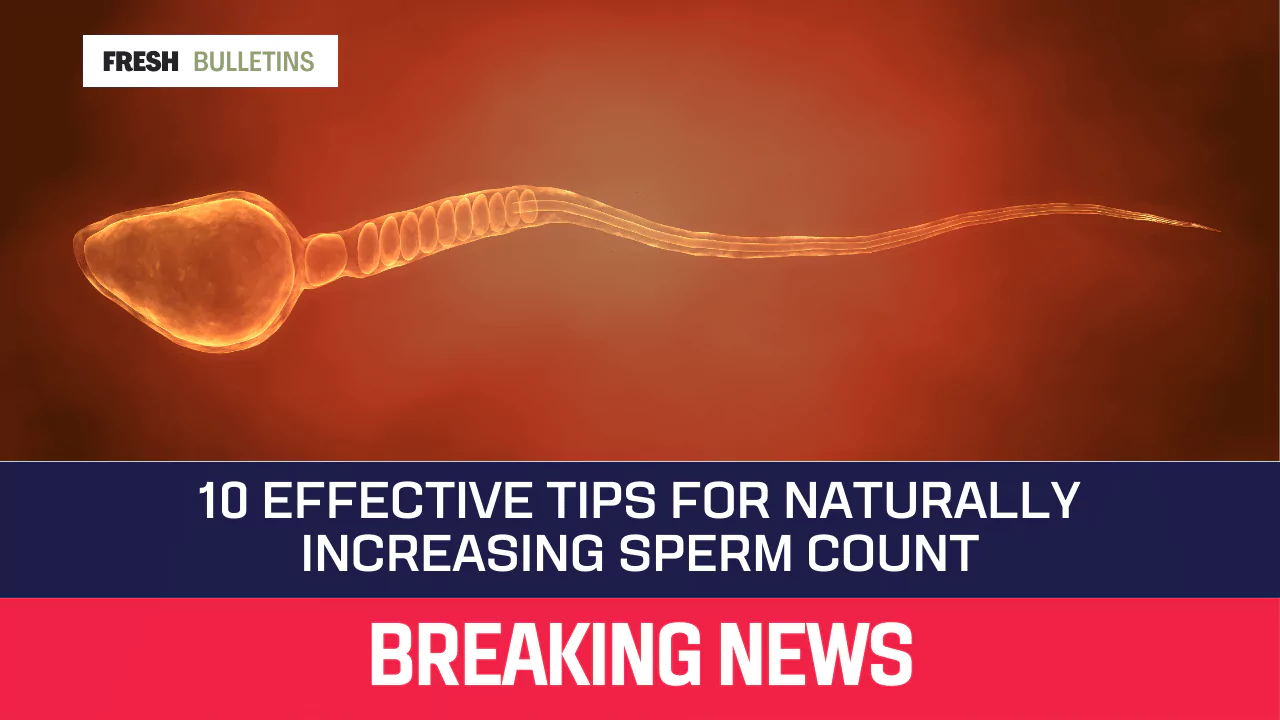10 Effective Tips For Naturally Increasing Sperm Count
Having trouble conceiving? Low sperm count could be a contributing factor. But before considering medical intervention, there are natural ways to boost your sperm production. Here are 10 effective tips to get you started.
Understanding Male Infertility
Male infertility refers to a man’s inability to cause pregnancy in a fertile female, and it plays a role in around half of all cases where couples face infertility. It can result from various factors, including:
- Low sperm production, abnormal sperm function, or blockages that prevent the delivery of sperm.
- Diseases, trauma, long-term health issues, way of life decisions, and additional elements.
- Hormonal imbalances, genetic disorders, or structural issues within the reproductive system.
Symptoms of male infertility might not be apparent until a couple tries to conceive. Some signs include problems with sexual function, pain or swelling in the testicle area, and lower than normal sperm count. Diagnosis typically involves a physical examination, medical history, and semen analysis to evaluate sperm count and quality.
10 Effective Tips for Naturally Increasing Sperm Count
1. Take D-Aspartic Acid Supplements
D-aspartic acid is an amino acid that can boost testosterone levels, which is crucial for sperm production. Taking these supplements can enhance sperm count and quality.
2. Exercise Regularly
Engaging in regular physical activity can raise testosterone levels and enhance fertility in general. Try to engage in moderate activity for at least 30 minutes every day of the week.
3. Get Enough Vitamin C and D
Vitamins C and D are essential for reproductive health. Vitamin C helps reduce oxidative stress and prevents sperm damage, while vitamin D has been linked to improved sperm motility and quality.
4. Relax and Minimize Stress
Prolonged stress can have a detrimental effect on sperm production and testosterone levels. To keep your mind at ease, try stress-relieving exercises like yoga, deep breathing, and meditation.
5. Quit Smoking
It has been found that smoking lowers sperm motility and count. Giving up smoking can greatly enhance the quality of sperm and your reproductive system as a whole.
6. Try Tribulus Terrestris
Tribulus Terrestris is a medicinal herb that has been used to enhance libido and improve sperm count. It works by boosting testosterone levels naturally.
7. Take Fenugreek Supplements
Fenugreek is another herb that can improve testosterone levels and increase sperm count. Studies have shown that fenugreek supplements can enhance overall reproductive health.
8. Get Enough Zinc
An essential mineral for male fertility is zinc. It affects the development of sperm and the synthesis of testosterone. Make sure your diet or supplements provide you with adequate zinc.
9. Wear Loose Clothes
Tight clothing can increase scrotal temperature, which negatively impacts sperm production. Wear loose-fitting underwear and pants to keep the testicles cool and promote healthy sperm production.
10. Eat Maca Root
Maca root is a Peruvian plant that has been shown to improve libido and increase sperm count. Incorporate maca root into your diet to boost fertility naturally.
Maintaining a Healthy Lifestyle for Better Sperm Count
Avoid Smoking, Excessive Alcohol, and Drug Use
These behaviors can drastically lower the motility and count of sperm. Steer clear of them to enhance fertility and boost the likelihood of conception.
Take Antioxidant Supplements
Antioxidants help protect sperm from oxidative damage. Consider taking supplements like coenzyme Q10, vitamin E, and selenium to enhance sperm health.
Consume Antioxidant-Rich Foods
Eating foods high in antioxidants, such as fruits, vegetables, nuts, and seeds, can also help protect sperm and improve overall reproductive health.
Incorporate Healthy Fats into the Diet
Healthy fats, like those found in avocados, nuts, and olive oil, support hormone production and improve sperm quality. Include these fats in your diet for better fertility.
Limit Exposure to Environmental and Occupational Contaminants
Exposure to chemicals, pesticides, and heavy metals can harm sperm production. Minimize exposure by using protective gear and avoiding polluted areas.
When to Seek Medical Help?
If you’ve been trying to conceive for a year without success or have concerns about your sperm health, consult a healthcare provider. They can assess your sperm count and motility through a semen analysis and recommend treatment options if necessary.
Factors Decreasing Sperm Count
- Undescended testicles: If one or both testicles fail to descend from the abdomen into the scrotum during fetal development, sperm production can be impaired.
- Varicocele: This is an enlargement of the veins in the scrotum, which can increase scrotal temperature and harm sperm production.
- Infections: Infections of the reproductive system, including sexually transmitted infections (STIs) and mumps, can damage sperm production.
- Certain medications: Some medications, such as chemotherapy drugs and anabolic steroids, can decrease sperm count.
- Medical conditions like cystic fibrosis: This genetic disorder can cause blockages in the vas deferens, the tubes that carry sperm from the testicles.
Treatment Options
- Medication: Medications can be used to address hormonal imbalances that contribute to low sperm count.
- Surgery: In some cases, surgery may be necessary to correct anatomical problems like varicocele or blockages in the vas deferens.
- Assisted reproductive technologies (ART): If other treatments are unsuccessful, ART procedures like in vitro fertilization (IVF) can help couples conceive.
When to See a Healthcare Provider
If you’ve been trying to conceive for over a year without success, it’s time to see a healthcare provider. They can help diagnose any underlying issues and recommend appropriate treatments.







